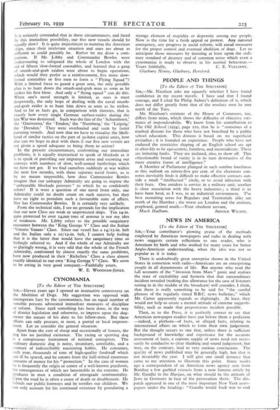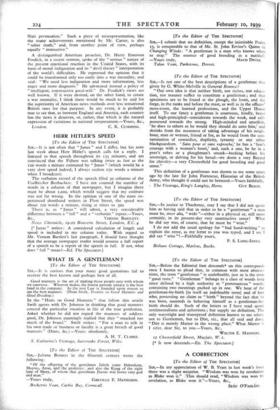NEWS IN AMERICA [To the Editor of THE SPECTATOR]
SIR,—Your contributor's glowing praise of the methods employed by American newspapers and radio in dealing with news suggests certain reflections to one reader, who is American by birth and who worked for many years for better Anglo-American understanding, when the idea was not so popular as it is today.
There is undoubtedly great enterprise shown in the United States in connexion with radio—Americans are an enterprising people in all departments of life. But anyone who read the full accounts of the "invasion from Mars" panic and realises the state of excitability and hysteria that that extraordinary incident revealed (making due allowance for the case of listeners tuning in in the middle of the broadcast) will consider, I think, that there is really something to be said for "the careful phrases of the regularly timed B.B.C. news bulletins," which Mr. Carter apparently regards so slightingly. At least, they would not help to create a mental attitude of extreme suggesti- bility, such as made that preposterous incident possible.
Then, as to the Press, it is perfectly correct to say that American newspaper readers have put before them a profusion —indeed, a plethora—of facts, or alleged facts, relating to international affairs on which to form their own judgement. But the thought occurs to one that, unless there is sufficient background of knowledge and experience for the accurate assessment of facts, a copious supply of news need not neces- sarily be conducive to clear thinking and sound judgement, but may, on the contrary, lead to very curious conclusions. The qua:ity of news published may be generally high, but that is not invariably the case. I will give one small instance that came to my attention to illustrate this point. Some weeks ago a correspondent of an American news agency sent from Bombay a few garbled extracts from a now famous article by Mr. Gandhi in the Harijan, on what should be the attitude of Jews in Germany in face of the persecution there. The dis- patch appeared in one of the most important New York news- papers under the heading: "Gandhi would back war to end Nazi persecution." Such a piece of misrepresentation, like the many achievements mentioned by Mr. Carter, is also "sober truth," and, from another point of view, perhaps equally "instructive."
A distinguished American preacher, Dr. Harry Emerson Fosdick, in a recent sermon, spoke of the " serious " nature of the present emotional reaction in the United States, with its basis of moral indignation and its "devil theory" interpretation of the world's difficulties. He expressed the opinion that it could be transformed only too easily into a war mentality, and said : "We need less indignation and more information, less anger and more diagnosis." He advocated instead a policy of "intelligent, constructive good-will." Dr. Fosdick's views are well known. If it were desired, on the other hand, to create a war mentality, I think there would be much to be said for the superiority of American news methods over less sensational British ones for that purpose. In any event, it is probably true to say that, as between England and America, each country has the news it deserves, or, rather, that which is the natural expression of variations in national temperament.—Yours, &c.,















































 Previous page
Previous page